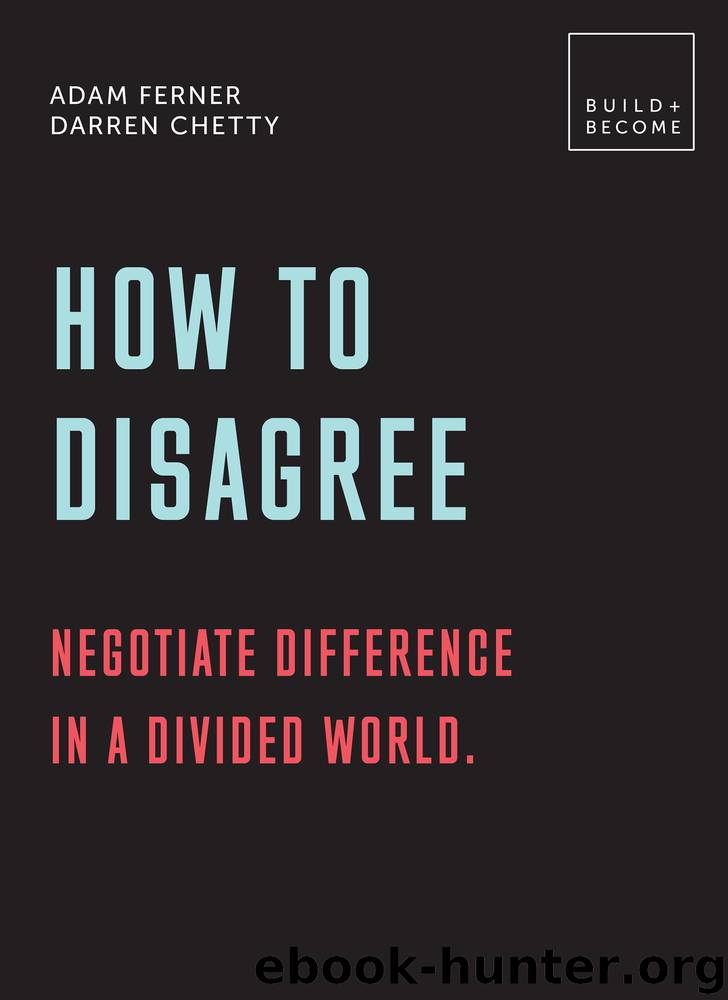How to Disagree by Adam Ferner

Author:Adam Ferner
Language: eng
Format: epub
Publisher: White Lion Publishing
Published: 2019-02-09T16:00:00+00:00
‘WHAT’S THE POINT?’
It’s easy to feel a little pessimistic. And pessimism can be further amplified by the thought that, even when we’re trying our hardest (perhaps especially when we’re trying our hardest), we may end up contributing to the problem. So what’s the point? What’s the point in political action? In ethical behaviour? Why should we bother when none of it amounts to a hill of beans?
These questions are the focus of Derrick Bell’s Faces at the Bottom of the Well (1992), where the law professor advances a position that he calls ‘Racial Realism’. Racial Realism is a response to optimistic declarations about political progress and claims about overcoming racism in America.
Black people will never gain full equality in this country. Even those Herculean efforts we hail as successful will produce no more than temporary ‘peaks of progress’, short-lived victories that slide into irrelevance as racial patterns adapt in ways that maintain white dominance.
Claims about progress and ‘solutions to racism’ are, for Bell, always delusions. We need to be realistic, he says. We aren’t going to be saved by deliberative democracy or automatic progress. Suggestions to the contrary are unhelpful. The philosopher Calvin L. Warren has developed this view in his book Ontological Terror (2019), writing that ‘humanist affect (the good feeling we get from hopeful solutions) will not translate into freedom, justice, recognition or resolution …’ In both Bell and Warren’s work, we see a clear articulation of the downsides to optimistic humanism. It feels nice to be hopeful, but this ‘affect’ is a distraction.
It’s unsurprising, perhaps, that Bell’s publishers worried his work would be too despairing for mainstream audiences. To this, Bell is said to have responded: ‘You don’t understand. For a black person in this society, the truth is never despairing.’ In contrast to the torpified subject described by Diller, Bell says the appropriate response to a pessimistic worldview is not inaction, but continued action. Things may appear hopeless, but we should struggle on regardless – we should continue the conversation. This view is also found in the work of the philosopher George Yancy, who recognizes the futility of trying to overcome certain deeply ingrained prejudices, but also acknowledges the importance of the attempt. For Yancy, men can be ‘anti-sexist sexists’, and white people can be ‘anti-racist racists’. We might never be able to overcome prejudices but that shouldn’t stop us from trying.
Bell, who died in 2011, put his theory into practice. Indeed, it was as a result of his attempts to diversify the university faculty that he lost his professorship at Harvard Law School. In 1990, his requests for the tenured appointment of a black female professor were dismissed, but he carried on anyway, until his own tenure was terminated. In 1998, the school’s first black female tenured professor, Lani Guinier, was appointed – which Bell would certainly have seen as a cause for celebration … but probably not hope.
Download
This site does not store any files on its server. We only index and link to content provided by other sites. Please contact the content providers to delete copyright contents if any and email us, we'll remove relevant links or contents immediately.
| General | Discrimination & Racism |
Nudge - Improving Decisions about Health, Wealth, and Happiness by Thaler Sunstein(7689)
The Fire Next Time by James Baldwin(5421)
iGen by Jean M. Twenge(5403)
Adulting by Kelly Williams Brown(4561)
The Sports Rules Book by Human Kinetics(4377)
The Hacking of the American Mind by Robert H. Lustig(4368)
The Ethical Slut by Janet W. Hardy(4236)
Captivate by Vanessa Van Edwards(3835)
Mummy Knew by Lisa James(3680)
In a Sunburned Country by Bill Bryson(3528)
The Worm at the Core by Sheldon Solomon(3483)
Ants Among Elephants by Sujatha Gidla(3458)
The 48 laws of power by Robert Greene & Joost Elffers(3219)
Suicide: A Study in Sociology by Emile Durkheim(3011)
The Slow Fix: Solve Problems, Work Smarter, and Live Better In a World Addicted to Speed by Carl Honore(3001)
The Tipping Point by Malcolm Gladwell(2908)
Humans of New York by Brandon Stanton(2864)
Handbook of Forensic Sociology and Psychology by Stephen J. Morewitz & Mark L. Goldstein(2691)
The Happy Hooker by Xaviera Hollander(2682)
